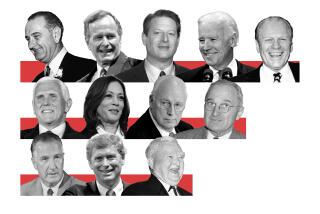DECISION ‘92: SPECIAL VOTER’S GUIDE TO THE PRESIDENTIAL ELECTION : THE RUNNING MATES: : QUAYLE: The vice president has warmed the Republican hearts with his blasts at lawyers and Hollywood. But can he overcome the ‘snicker factor’?
- Share via
WASHINGTON — They have been piling up throughout this campaign, all those new books on George Bush’s foreign policy, Al Gore’s environmental views, Bill Clinton’s setbacks and comebacks.
But the shelf space devoted to Vice President Dan Quayle is dominated by writers who have come neither to praise nor bury him, but to ridicule him. “Imperial Caddy,” “Airhead Apparent,” “Quayle Hunting” and “What a Waste It Is to Lose One’s Mind” are among the titles on a lengthening list.
These books point to the central question of Quayle’s candidacy: Could a vice president who has been so thoroughly lampooned exert leadership in the top job?
Vice presidents who become chief executive on the death or resignation of a predecessor always take over at a disadvantage. With his high negative ratings, Quayle would face an even tougher task carving out a new policy agenda, getting his way on Capitol Hill or even leading the nation in a war.
Analysts from a range of political perspectives agree that this is his most serious weakness. And some say Quayle’s difficulty in overcoming this problem could be compounded by another weakness: uneven communications skills.
“There’s a very large snicker factor, and that would be a very large detriment,” said Kenneth L. Adelman, the Ronald Reagan Administration’s top arms control negotiator who is a close friend of Quayle. “He starts from an enormous hole.”
Quayle went some distance toward answering that criticism with his spirited performance in the vice presidential debate. He glibly concentrated his fire on Bill Clinton, and did so with a smile.
But Quayle’s image problems go beyond those of most vice presidents--including Bush himself when compared to Reagan.
“He’s probably the least popular--and the most visible,” said Paul C. Light, a political scientist at the University of Minnesota who has written on the vice presidency.
At the Republican Convention in August, Quayle and his staff made an all-out effort to revise the view of him that many Americans formed four years before as the pampered scion of a wealthy Indiana publishing family.
To no avail. Polling by the Gallup Organization from Aug. 31 to Sept. 2 found that 57% had an unfavorable view of him--statistically identical to the 59% who had that view before the convention.
If he took over from Bush, Quayle would benefit from public sympathy. But “that bump wouldn’t be huge, and before long he’d have to rely on his own ability to sell himself,” Light said.
In his speaking skills, Quayle is a politician who sometimes seems agile in close-quarter debate and can deliver a good speech, as he did when he accepted the Republican nomination in Houston--and as his debate performance showed. But at other times he seems flat-footed.
“When he’s briefed on a subject, he is very good,” said David Mason, an analyst at the conservative Heritage Foundation in Washington. ‘When he’s not, you’ve got the deer-in-the-headlights problem.”
With the help of a talented and ideological staff, Quayle has tried to push Bush’s domestic policy to the right and has given an edge to the Republican political agenda.
Quayle has exerted his greatest domestic influence as head of the White House Council on Competitiveness, a group formed to ease the regulatory burden on business.
In the environmental area alone, in the last two years the organization has narrowed the government’s definition of protected wetlands, eased restrictions imposed on polluting industries by the Clean Air Act and allowed the airline industry more time to phase out older, noisier jets.
Quayle has been widely praised as a political tactician. In the last year, he has warmed Republican hearts with his scattershot blasts at plaintiffs’ lawyers, Hollywood, abortion rights activists and “Murphy Brown.” Still, not all of the attacks have been bull’s-eyes.
In May, when the White House was trying to shore up its conservative support, the criticism of sitcom news anchor Murphy Brown seemed inspired. But by September, when Republicans were wooing moderate voters, the lingering controversy was a distraction and an embarrassment.
The vice president’s admirers contend that he has also played a role in foreign policy--that he urged Bush to seek congressional approval of the Gulf War, for example, and to swing U.S. allegiance to Boris N. Yeltsin from Mikhail S. Gorbachev.
Critics say that in both cases Quayle’s voice was one among several urging those positions. Quayle wins praise for his temperament. He has taken years of pounding with little complaint, is considered personally likable and is given high marks for surrounding himself with people who may be smarter than he is.
Although Quayle is known for his attacks on liberals, some political scientists and legislators who watched his congressional career insist that he is pragmatic. “He is an economic conservative,” Sen. Steve Symms, (R-Ida.) said.
Because of his willingness to work with opponents, some analysts assert that he might prove to be a flexible President.
In a 1963 book called “Power, Corruption and Rectitude,” Harold D. Lasswell and Arnold A. Rogow dissected the careers of Harry S. Truman, Martin Van Buren and Chester A. Arthur to argue that unpromising vice presidents have sometimes proved effective as presidents.
“There are several like that in history, and Quayle might turn out to be one of them,” said Ross Baker, political scientist at Rutgers University. But he added others, such as Andrew Johnson, began inauspiciously as vice presidents and “turned out to be disasters.”
More to Read
Get the L.A. Times Politics newsletter
Deeply reported insights into legislation, politics and policy from Sacramento, Washington and beyond. In your inbox twice per week.
You may occasionally receive promotional content from the Los Angeles Times.











